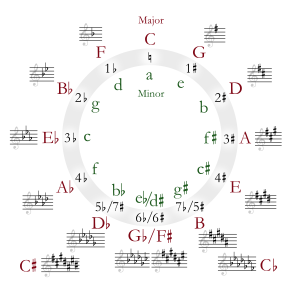B minor: Difference between revisions
m Reverted edits by 121.208.67.109 (talk) to last version by Anton Mravcek |
|||
| Line 43: | Line 43: | ||
* "[[Get the Party Started]]" - [[Pink (singer)|Pink]] |
* "[[Get the Party Started]]" - [[Pink (singer)|Pink]] |
||
* "[[Diamonds Are Forever]]" - [[Shirley Bassey]] |
* "[[Diamonds Are Forever]]" - [[Shirley Bassey]] |
||
Santa claus woooooo |
|||
== Well-known classical compositions in this key== |
== Well-known classical compositions in this key== |
||
Revision as of 05:17, 22 July 2007
 | |
| Relative key | D major |
|---|---|
| Parallel key | B major |
| Component pitches | |
| B, C#, D, E, F#, G, A | |
- Also see: B major, or B-flat minor.
B minor is a minor scale based on B, consisting of the pitches B, C-sharp, D, E, F-sharp, G, A and B. (natural minor scale - the harmonic minor scale contains a A# instead of a A). Its key signature has two sharps linked Scales/keys below (see below: Scales and keys). In Germany, Scandinavia, Serbia, Croatia and Poland it is referred to as "h-moll".
Its relative major is D major, and its parallel major is B major.
Changes needed for the melodic and harmonic versions of the scale are written in with accidentals as necessary.
B minor is the relative minor of D major. B is an open string on standard tuning guitars, and on 5 string bass guitars.
In baroque times, B minor was regarded as the key of passive suffering.[1] The theorist christian Daniel Schubart regarded B minor as a key expressing a quiet acceptance of fate and very gentle complaint, something commentators find to be in line with Bach's use of the key in the St. John's Passion.[2] By Beethoven's time, however, the perception of B minor had changed considerably: Francesco Galeazzi wrote that B minor was not suitable for music in good taste, and Beethoven labelled a B minor melodic idea in one of his sketchbooks as a "black key".[3]
It is a common key used in rock, folk, country and other guitaristic styles because the standard tuning of a guitar causes all the open strings to be scale degrees of B minor. According to Spinal Tap guitarist Nigel Tufnel, B Minor is, "the saddest of keys."
Well-known popular music in this key
- "Building a Mystery" - Sarah McLachlan
- "Sunday Bloody Sunday" - U2
- "Hurt” - Nine Inch Nails
- "Hotel California” - The Eagles
- "Let's Get Retarded" - Black Eyed Peas
- "Iron Man" - Black Sabbath
- "What Time Is Love?" - The KLF
- "Whip It"-Devo
- "Money" - Pink Floyd
- "Down Under" - Men at Work
- "Jammin'" - Bob Marley
- "Get the Party Started" - Pink
- "Diamonds Are Forever" - Shirley Bassey
Well-known classical compositions in this key
- E lucevan le stelle - Puccini's Tosca
- Mass in B minor - J.S. Bach
- Unfinished Symphony - Franz Schubert
- Violin Concerto No. 2 'La Campanella' - Niccolò Paganini
- Piano Sonata No. 3 - Frederic Chopin
- Scherzo No. 1 - Frederic Chopin
- Concerto No. 2 for Double Bass and Orchestra - Giovanni Bottesini
- Piano Sonata in B Minor - Franz Liszt
- Symphony No. 2 - Alexander Borodin
- Cello Concerto - Antonín Dvořák
- Pathétique Symphony - Pyotr Ilyich Tchaikovsky
- Romeo and Juliet Overture - Pyotr Ilyich Tchaikovsky
- In the Hall of the Mountain King - Edvard Grieg
- Symphony No. 6 - Dmitri Shostakovich
- Piano Sonata h-Moll op.61 - Dmitri Shostakovich
- Violin Concerto - Edward Elgar
References
- ^ Xinh's JS Bach B-Minor Mass Balance. Retrieved January 20, 2007.
- ^ Michael C. Tusa, "Beethoven's "C-Minor Mood": Some Thoughts on the Structural Implications of Key Choice" in Beethoven Forum 2, Christoph Reynolds, ed. Lincoln: University of Nebraska Press (1993): 2 - 3, n. 5
- ^ Ibid, 2, n. 3

